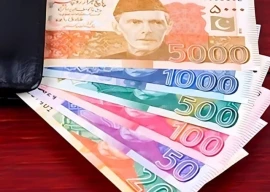In its first year, the PML-N government could not achieve all but one of the economic targets it promised to deliver in its election manifesto and prospects for the current year also remain uncertain, shows the findings of an independent think tank.
Reduction in budget deficit was the only target the PML-N delivered in its first year in power, said Dr Hafiz Pasha, a renowned economist and a former finance minister, while sharing findings of the Institute for Policy Reforms (IPR).
In its elections manifesto, the PML-N outlined 14 economic targets out of which nine were related to macroeconomics, two in the power sector and three in the social sector.
Dr Pasha said there was some improvement on three goals but progress remained below the desired results. He added that the situation remained the same in five areas while it deteriorated in the case of five critical sectors.
The IPR noticed improvements in areas of tax-to-GDP ratio and though collection fell short of the target, there was slight improvement in public debt to GDP ratio and increase in health spending as percentage of GDP.
The tax-to-GDP ratio improved from 9% to 9.3% but fell short of the target of 10.2%. The public debt-to-GDP ratio slightly improved but was still in violation of statutory limit.

Most sectors remained almost at a standstill. In the case of Large Scale Manufacturing (LSM) growth, technical and line losses remained at 17.5%, spending on education as percentage of GDP was still at 2.1% and social protection spending was 1.1% of the GDP.
However, there was marked deterioration in the case of economic growth, inflation, investment, non salary expenses and recovery of electricity bills. The electricity bills recovery ratio fell to 90% from the level of 94% in the last year of the PPP government.
The PML-N manifesto is an impressive document but what is required is the implementation of the promised reforms, said Dr Pasha.
Dr Pasha said there was clear success in reducing the fiscal deficit to the targeted level but the work of “creative accounting cannot be ruled out”.
He said heavy reliance on foreign borrowing remained the hallmark of the previous year and the PML-N government added $5 billion to the country’s external debt. He suggested the government to focus on the revival of the economy.
Dr Pasha said the most worrisome aspect was that the economic growth rate did not improve. He said although the government did not officially release the revised GDP growth rate figure, the IPR’s assessment, which is based on official data, suggests that the growth was in the trajectory of 3.3% to 3.5% last year.
“The economy seems to be locked in a slow growth trap and underlying economic weaknesses persist,” said Humayun Akhtar Khan, former minister for commerce and chairman of IPR Board. He said with the decline in both public and private investment, people do not know from where the driver of growth will come.
Future prospects
“The new fiscal year has not started very well and there is a reversal of few positive developments that took place in the last fiscal year,” said Dr Pasha. He said the 4.9% fiscal deficit target will be missed, development budget is expected to be cut due to shortfall in tax revenues, investment will not pick up and economic growth rate will remain at best at 4% due to uncertainty, floods and persistent load shedding.
He urged the finance minister to improve coordination with other economic ministers.
Dr Pasha said the government slashed Rs65 billion in federal development spending during the first three months.
He said prices of wheat, palm oil, cotton and crude oil fell significantly in the international market in the first quarter but there was no benefit to domestic consumers.
Dr Pasha said despite slight improvement in fuel mix, which warrants reduction in fuel price adjustment, the electricity prices were increased through power equalisation surcharge.
Published in The Express Tribune, November 21st, 2014.
Like Business on Facebook, follow @TribuneBiz on Twitter to stay informed and join in the conversation.
COMMENTS (19)
Comments are moderated and generally will be posted if they are on-topic and not abusive.
For more information, please see our Comments FAQ

















The Irony in the Comments. People Blaming something for this Economical downfall that actually has been trying to keep the Government on Track. N-League Supporter Logic: You're not Good at it, Blame it on someone else or point out the something worse on the other.
I feel sorry for those guys who are obsessed with IK / TuQ for the economic downtrend, but they do not seem to follow the analysis by SBP that there has been growth during the period of dharnas...check it out guys before you people criticise just for the sake of criticism....
They have failed to every extent in delivering relief for the citizens of this nation still they want to be in power its now Army s turn to come back in form and take over the charge like always they do in time of need to save us from these corrupt politicians who only thinks about their own commissions and interests all but one so its about the change has to come from GHQ now. .
The report has missed one important fact that being Nawaz Shareef and family have successfully achieved all their economic targets and now are richer by a petty few more billions.
......but how many foreign properties have they purchased in this time ?
What else can we expect from a government who is rewarding his cronies and friends. They are not ready to resolve the political crisis in amicable manner and has linger the crisis due to the insecurity and ego. The priority of the government is wrong when they are not ready to spend on the people of Pakistan and wasting money on useless mega projects which will only benefit few individual. This was bound to happen and it will be worst situation in the coming years.
The beauty of Pakistani democracy: either blame your failures on others or say others are worse.
@Ahmed: If you mean to say that two elected officials who are working for the country should in any way be equated to a sore loser who wants to destabilize the government at all costs ( Imran Khan) or some runaway cleric who lives on welfare in Canada but sees himself as Lenin and Marx all rolled into one ( Tahirul Qadri) then you are right. I for one wish to see the elected government complete its term as it was elected by the majority and if it is found lacking in 2018, then vote it out. As it is, we won't be able to judge them fairly since the two jokers of PTI and PAT are doing their best to disrupt democracy and destroy the economy.
@Ch. Allah Daad: LOL, you are a pathetic little man, more like sheep that can be herded wherever their handlers wants. The stooges made them borrow billions of dollars right, the stooges stopped them from collecting taxes, get real.
@Ch. Allah Daad: You mean the two brothers from Punjab?
For the first time I totally want to agree with you except that there is a whole family of them.
because of India's unprovoked cross border firing
Isn't education a provincial subject ?!?!
And the government would have done much better had it not been for IK's anti-state activities (burning electricity bills , scaring off FDI, encouraging people for not paying taxes , violence on the streets of Isloo, etc.)
Ha! title says it all.... as if there were ever any doubts!!!!!
That's what the dharna party aimed for. Like it or not Pakistan's economy was on right track before the dharna. You see more foreigners on the roads of capital than ever before but sit ins have adversely affected the economy
where is ahsan iqbal? why am i not surprised?
'He said heavy reliance on foreign borrowing remained the hallmark of the previous year and the PML-N government added $5 billion to the country’s external debt'. Borrowing coupled with privatization have always been hallmark of NS's economic policy.
I am just thinking how much of this money has gone into our bureaucrats' and politicians' pockets. Reportedly, our politicians' businesses are doing very well, Saad Rafique's business alone has grown exponentially since he became a statesman.
Alas, only our country and state institutions continue to suffer because of misguided economic policies.
If anyone wants to criticize this government, first he or she should criticize those two stooges who have brought us to this point.
IK!